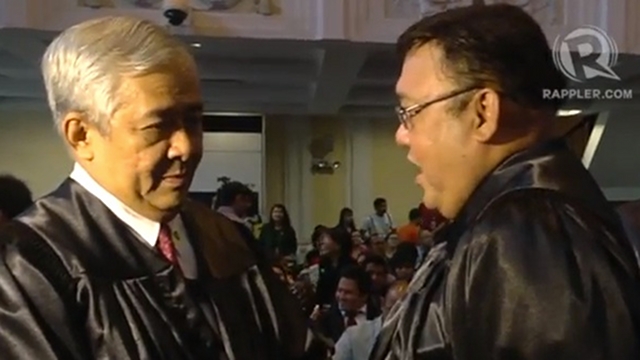SUMMARY
This is AI generated summarization, which may have errors. For context, always refer to the full article.

MANILA, Philippines – Strike down any other provision in the Cybercrime Prevention Act of 2012, but not the one allowing real-time collection of traffic data.
Solicitor general Francis Jardeleza said on Tuesday, January 29, that the Supreme Court should uphold Sec.12 of Republic Act 10175 because it is the “heart” of the controversial law.
Sec. 12 allows authorities to conduct warrantless real-time collection of traffic data. Jardeleza said it is an investigative tool that makes tracing, tracking and arresting hackers more efficient.
He added that since hackers are faceless, the real-time collection of traffic data would enable law enforcers to locate and identify them through their IP or Internet Protocol address.
“Sec. 12 will only bring law enforcement to IP address, not address like Kalaw 1, 2, 3,4, 5,” he said.
To quell fears that the law could be used to violate the privacy of innocent people, Jardeleza said authorities will only be collecting traffic data on those who are suspected of commiting cybercrimes.
“The specter of Big Brother was raised,” he said. “We categorically say RA 10175 does not authorize Big Brother surveillance.”
Given how important it is in the pursuit of hackers, Jardeleza said the High Court should “save” this provision, if it decides to nullify others which are also deemed unconstitutional.
These include Sec. 4, which criminalizes online libel and Sec. 5, which penalizes the abetting of commission of cybercrimes. Sections 6 and 7 include all crimes in the Revised Penal Code under the cybercrime law and increase the corresponding penalties to one degree.
Sereno said that if Sec. 12 – the heart of the law – is nullified, the law will be considered “good for nothing.”
What is due cause?
The provision however is problematic.
Jardeleza himself said during the oral arguments that Sec.12 is “constitutional, but just barely.”
Justices pointed out that the red flag in the provision is the lack of definition of “due cause.” Sec. 12 states that authorities can collect data without a court warrant if there is “due cause.”
“What is due cause under Sec. 12? What kind of animal is this and who identifies this animal?” Chief Justice Maria Lourdes Sereno asked Jardeleza.
Justice Mariano del Castillo said that if due cause has no clear definition, Sec.12 could be open to abuse.
Jardeleza explained that if someone filed a complaint involving a certain personality, then that constitutes “due cause.” He admitted though that “more robust procedures” could be developed and that law enforcers could address these concerns through their internal rules.
Justice Antonio Carpio also said that a court warrant should be secured first before traffic data could be collected.
“Let us go to the judge! If you want we can designate a judge 24/7. You can go to his house,” he said.
Jardeleza buckled however as he acknowledged one by one the shortcomings of the law.
When Justice Teresita Leonardo de Castro pointed out that the law does not say how due cause is to be determined, Jardeleza said she’s correct.
Define this, define that
When Justice Lucas Bersamin said that Sec.5.b, or the attempt to commit cybercrimes, – which is also considered a punishable offense under the law – does not require an overt act as specified in the Revised Penal Code, Jardeleza conceded that the cybercrime law indeed does not provide any qualification or definition of what constitutes “attempt.”
When Jardeleza tried to clarify that the provision penalizing cybersex covers offenses of prostitution and human trafficking, Justice Roberto Abad said that these terms are not found in the said provision.
Jardeleza was able to clarify concerns though on double jeopardy.
He said that journalists need not worry that they could be prosecuted for committing libel in the traditional media and online. “Can a journalist who works for the same newspaper which has an online edition be prosecuted twice? No,” he said.
Jardeleza said the government is firm though in its stand that online libel should be penalized, as stated in Sec.4 (c) 4 of the Cybercrime law.
He said an attack against reputation is defamation regardless of what medium is used.
“Defamation is defamation, whether we communicate through megaphones, letters, radio, tv or email,” he said.
When asked if liabiity in libel extends to those who “like” a defamatory Facebook post, Jardeleza answered in the affirmative.
“A ‘like’ is an approval of opinion,” he said.
Abad said this makes the law “bad” because it could have a “chilling effect.” – Rappler.com
Add a comment
How does this make you feel?
There are no comments yet. Add your comment to start the conversation.